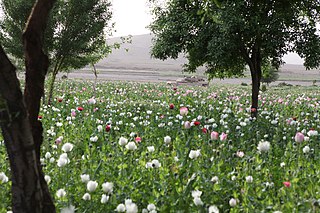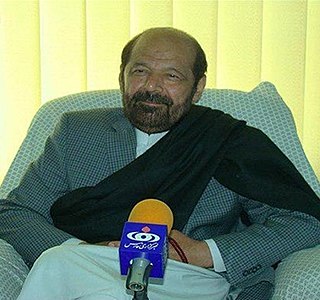
Zalmay Mamozy Khalilzad is an Afghan-American diplomat and foreign policy expert. Khalilzad was U.S. Special Representative for Afghanistan Reconciliation from September 2018 to October 2021. Khailzad was appointed by President George W. Bush to serve as United States Ambassador to the United Nations, serving in the role from 2007 to 2009. Khalilzad was the highest ranking Muslim-American in government at the time he left the position. Prior to this, Khalilzad served in the Bush administration as Ambassador to Afghanistan from 2004 to 2005 and Ambassador to Iraq from 2005 to 2007.

A Provincial Reconstruction Team (PRT) was a unit introduced by the United States government, consisting of military officers, diplomats, and reconstruction subject matter experts, working to support reconstruction efforts in unstable states. PRTs were first established in Afghanistan in early 2002, and were used in Iraq as well. While the concepts are similar, PRTs in Afghanistan and Iraq had separate compositions and missions. Their common purpose, however, was to empower local governments to govern their constituents more effectively.

Afghanistan has long had a history of opium poppy cultivation and harvest. As of 2021, Afghanistan's harvest produces more than 90% of illicit heroin globally, and more than 95% of the European supply. More land is used for opium in Afghanistan than is used for coca cultivation in Latin America. The country has been the world's leading illicit drug producer since 2001. In 2007, 93% of the non-pharmaceutical-grade opiates on the world market originated in Afghanistan. By 2019 Afghanistan still produced about 84% of the world market. This amounts to an export value of about US$4 billion, with a quarter being earned by opium farmers and the rest going to district officials, insurgents, warlords, and drug traffickers. In the seven years (1994–2000) prior to a Taliban opium ban, the Afghan farmers' share of gross income from opium was divided among 200,000 families. As of 2017, opium production provides about 400,000 jobs in Afghanistan, more than the Afghan National Security Forces. In addition to opium, Afghanistan is also the world's leading producer of hashish.

Sarah Chayes is a former senior associate in the Democracy and Rule of Law Program at the Carnegie Endowment for International Peace and former reporter for National Public Radio, she also served as special advisor to the Chairman of the Joint Chiefs of Staff.

The 1992–1996 Afghan Civil War took place between 28 April 1992—the date a new interim Afghan government was supposed to replace the Republic of Afghanistan of President Mohammad Najibullah—and the Taliban's conquest of Kabul establishing the Islamic Emirate of Afghanistan on 27 September 1996.
Seth G. Jones is an academic, political scientist and author. Jones is most renowned for his work on counterinsurgency and counterterrorism; much of his published material and media presence relates to US strategy in Afghanistan and Pakistan, and in confronting al-Qāʿida. He is currently a Fellow and Director at the Center for Strategic and International Studies (CSIS).
Reconstruction in Afghanistan refers to the efforts to improve Afghanistan's governance as well as physical buildings and infrastructure following the overthrow of the First Islamic Emirate of Afghanistan by the United States. These efforts involved various groups including supranational organizations, the Afghan government, the US government and other foreign governments, and civilians. These efforts also include training civil administrators, improving essential services and public safety, supporting civil society and self-determination, and promoting the rule of law and economic development.
The following lists events that happened during 2004 in Afghanistan.
Dan Grant was the Deputy Assistant to the Administrator for Pakistan in the Office of Afghanistan and Pakistan Affairs at USAID. He oversaw a portfolio concerning energy, stabilization, education, agriculture, and public health.

Mohammad Haneef Atmar is the former Minister of Foreign Affairs and a former Interior Minister of Afghanistan. He was removed from the Ministry of Interior Affairs by Hamid Karzai in the wake of attacks on the June 2010 Afghan Peace Jirga. Before that he worked with several international humanitarian organisations and served as Minister of Rural Rehabilitation and Development and Minister of Education. In 2011, he was part of the Right and Justice party. During his time in office, he has visited several countries to get funding to stabilise Afghanistan.
This is a list of activities ostensibly carried out by the U.S. Central Intelligence Agency (CIA) within Pakistan. It has been alleged by such authors as Ahmed Rashid that the CIA and ISI have been waging a clandestine war. The Afghan Taliban—with whom the United States is officially in conflict—is headquartered in Pakistan's Federally Administered Tribal Areas and according to some reports is largely funded by the ISI. The Pakistani government denies this.

Relations between Afghanistan and Tajikistan began in 1992. Afghanistan maintains an embassy in Dushanbe and a consulate in Khorugh. The current Afghanistan ambassador to Tajikistan is LTG. Mohammad Zahir Aghbar. Tajikistan maintains an embassy in Kabul and a consulate in Mazari Sharif, Faizabad and Kunduz. The current Tajikistan ambassador to Afghanistan is Sharofiddin Imom.

The Leadership Council of the Islamic Emirate of Afghanistan, also translated as the Supreme Council, is the central governing body of the Taliban and Afghanistan. The Taliban uses a consensus decision-making model among members of the Leadership Council, though the supreme leader, who chairs the council, has ultimate authority and may override or circumvent it at any time. It played a key role in directing the Taliban insurgency from Quetta, Pakistan, which led to it being informally referred to as the Quetta Shura at the time.

Sayed Hussein Anwari was a politician in Afghanistan. He was a Shia and came from Mohammed Asef Mohseni's Harakat-e Islami.

Matthew Rosenberg is a Pulitzer-Prize winning American journalist who covers national security issues for The New York Times. He previously spent 15 years as a foreign correspondent in Asia, Africa and the Middle East, and was expelled from Afghanistan in August 2014 on the orders of President Hamid Karzai, the first expulsion of a Western journalist from Afghanistan since the Taliban ruled the country.
2003 in Afghanistan. A list of notable incidents in Afghanistan during 2003
International Relief and Development, Inc. (IRD), renamed Blumont, is an organization that purports to provide relief, stabilization, and development programs worldwide. In 2015, IRD was the subject of a Washington Post investigation that highlighted the organization's performance and management of taxpayer money. Among other irregularities, the organization had charged the US Government $1.1 million for staff parties and retreats at exclusive resorts. In January 2016, IRD announced that it was changing its name to Blumont and relocating to Madison, Wisconsin.
Chemonics International, Inc. is a private international development firm based in Washington, D.C. It was established in 1975 by Thurston F. (Tony) Teele as a subsidiary of Erly Industries. The employee-owned company offers a variety of services globally and with more than $1.5 billion in USAID contracts in 2019 is the largest for-profit recipient of U.S. government foreign aid. As of 2019 the company has approximately 5,000 employees in 100 countries.

The Islamic Republic of Afghanistan was a presidential republic that ruled Afghanistan from 2004 to 2021. The state was established to replace the Afghan interim (2001–2002) and transitional (2002–2004) administrations, which were formed after the 2001 United States invasion of Afghanistan that had toppled the partially recognized Taliban-ruled Islamic Emirate of Afghanistan. However, on 15 August 2021, the country was recaptured by the Taliban, which marked the end of the 2001–2021 war, the longest war in US history. This led to the overthrow of the Islamic Republic, led by President Ashraf Ghani, and the reinstatement of the Islamic Emirate under the control of the Taliban. The United Nations still recognizes the Islamic Republic as the legitimate government of Afghanistan instead of the Islamic Emirate, the de facto ruling government. The US–Taliban deal, signed on 29 February 2020 in Qatar, was one of the critical events that caused the collapse of the Afghan National Security Forces (ANSF). Following the deal, the US dramatically reduced the number of air attacks and deprived the ANSF of a critical edge in fighting the Taliban insurgency, leading to the Taliban takeover of Kabul.
The 20-year-long War in Afghanistan had a number of significant impacts on Afghan society.











